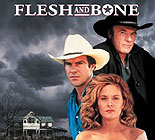|
|
|
|
Flesh
and Bone
|
 |
|
In a cinema market increasingly geared to a hysterical boom-or-bust mentality – each new movie, whether expensively or modestly made, needing a spectacular, controversial or ground-breaking quality – home-viewing formats have become the place where quieter films can eventually be appreciated on their own terms. Steve Kloves' Flesh and Bone, like Steven Soderbergh's King of the Hill (1993), belongs to this rich vein of underrated achievements. Although the moody Texas setting and the grim plot material of murder and psychological abuse led many to expect another Blood Simple (1984) or At Close Range (1986), Flesh and Bone is a strikingly understated movie with a slow, cumulative emotional effect. Arlis (Dennis Quaid) is a withdrawn soul struggling to erase the memory of his violent father Roy (James Caan) and a tragic crime to which, as a child, he was made an accomplice. When Kay (Meg Ryan) lands in town and a love story tentatively begins, Arlis finds his daily routines disturbed both by passion and by haunting signs that his past is about to catch up with him. Roy appears with a new partner, a teenage thief (Gwyneth Paltrow), scheming to clean up the "loose ends" of his evil history. Writer-director Kloves drains the melodrama from this story and concentrates on suggestive moments of interpersonal exchange, particularly between Arlis and Kay. The script is brilliantly constructed so as to bring out parallels and contrasts between the characters. The whole tone and meaning of the drama hangs on figures of ordinary speech ("you're crowding me", "it's in the blood") that become unbearably poignant with repetition. With Flesh and Bone Kloves has pushed far beyond the easy pathos of his previous The Fabulous Baker Boys (1989) to make a film as resonant, poetic and sad as Gary Sinise's Miles From Home (1988) or Robert Mulligan's The Man in the Moon (1991) – low-key movies which have also been abandoned by the mainstream to hopefully find their appreciative audiences on video and DVD. © Adrian Martin August 1994 |
![]()